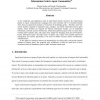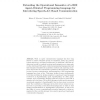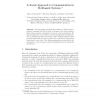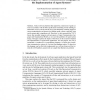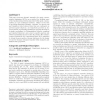HICSS
1999
IEEE
14 years 5 months ago
1999
IEEE
As the complexity and application scope of agent-based systems increases, the requirements placed on Agent Communication Languages have also increased with it. Currently-available...
ICCS
2003
Springer
14 years 6 months ago
2003
Springer
Agent communication languages such as KQML and the FIPA ACL serve as metalanguages to define software agent message-passing protocols. These metalanguages are incompatible with eac...
DALT
2003
Springer
14 years 6 months ago
2003
Springer
Work on agent communication languages has since long striven to achieve adequate speech act semantics; partly, the problem is that references to an agent’s architecture (in parti...
DALT
2003
Springer
14 years 6 months ago
2003
Springer
Abstract. This paper aims at defining the semantics of Agent Communication Languages (ACLs) in terms of changes in the social relationships between agents, represented in terms of...
CIA
2004
Springer
14 years 6 months ago
2004
Springer
Abstract. Today’s software platforms that support the construction of agent systems in accordance with the FIPA specifications essentially provide enabling infrastructure servic...
ATAL
2004
Springer
14 years 6 months ago
2004
Springer
The missing of an appropriate semantics of agent communication languages is one of the most challenging issues of contemporary AI. Although several approaches to this problem exis...
ACOM
2006
Springer
14 years 6 months ago
2006
Springer
Communication in multi-agent systems (MASs) is usually governed by agent communication languages (ACLs) and communication protocols carrying a clear cut semantics. With an increasi...
DALT
2007
Springer
14 years 7 months ago
2007
Springer
We address the problem of standardising the semantics of agent communication. The diversity of existing approaches suggests that no single agent communication language can satisfac...
CEEMAS
2007
Springer
14 years 7 months ago
2007
Springer
Abstract. Agent Communication Languages (ACLs) play a fundamental role in open multiagent systems where message exchange is the main if not the only way for agents to coordinate th...
ATAL
2007
Springer
14 years 7 months ago
2007
Springer
This paper proposes dynamic semantics for agent communication languages (ACLs) as a method for tackling some of the fundamental problems associated with agent communication in ope...
